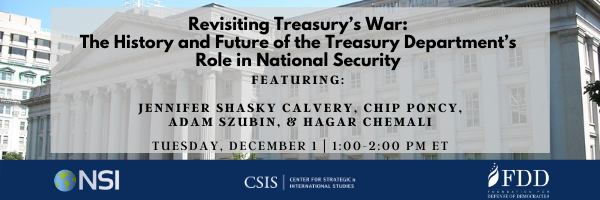
The National Security Institute, the Foundation for Defense of Democracies, and the Center for Strategic and International Studies were excited to co-host our second panel in our Revisiting Treasury’s War: The History and Future of the Treasury Department’s Role in National Security.
Panel 2 – Challenges and Opportunities in Treasury’s War: Future Financial Measures for Policy Innovation and Implementation
Tuesday, December 1 | 1:00-2:00 PM ET
The panel explored the key challenges the Treasury Department and TFI—as well as its components—face as the U.S. increasingly relies upon such financial measures to help achieve core foreign policy and national security goals.
Featured:
- Jennifer Shasky Calvery, former Director of the Financial Crimes Enforcement Network;
- Chip Poncy, former Director of the Office of Strategic Policy for Terrorist Financing and Financial Crimes;
- Adam Szubin, former Acting Under Secretary for Terrorism and Financial Intelligence; and
- Hagar Chemali, former Spokesperson for Terrorism and Financial Intelligence (moderator)
Speaker Bios:
 Jennifer Shasky Calvery was the director of the Financial Crimes Enforcement Network of the United States Department of the Treasury from September 22, 2012 until May 27, 2016. Her prior experience included 15 years at the Department of Justice.
Jennifer Shasky Calvery was the director of the Financial Crimes Enforcement Network of the United States Department of the Treasury from September 22, 2012 until May 27, 2016. Her prior experience included 15 years at the Department of Justice.

Chip Poncy serves as senior advisor of FDD’s Center on Economic and Financial Power (CEFP). Chip is the president and co-founder of the Financial Integrity Network (FIN). From 2002 to 2013, Chip served as the inaugural director of the Office of Strategic Policy for Terrorist Financing and Financial Crimes (OSP) and a senior advisor at the U.S. Department of the Treasury. As the director of OSP from 2006 to 2013, Chip led an office of strategic policy advisors in creating policies and initiatives to combat the full spectrum of illicit finance, including money laundering, terrorist financing, WMD proliferation financing, and kleptocracy flows. As a senior advisor from 2002 to 2006, Chip assisted Treasury leadership in developing the U.S. Government’s post-9/11 strategy to combat terrorist financing. He also assisted senior leadership in creating and developing the Office of Terrorism and Financial Intelligence in the post-9/11 government reorganization.

Adam Szubin previously served as the Acting Under Secretary for Terrorism and Financial Intelligence at the Treasury Department. In this role, Mr. Szubin led the policy, enforcement, regulatory, and intelligence functions of the Treasury Department aimed at identifying and disrupting the lines of financial support to international terrorist organizations, proliferators of weapons of mass destruction, narcotics traffickers, and other actors posing a threat to our national security or foreign policy. During the transition in administrations in 2017, Mr. Szubin served as the Acting Secretary of the Treasury. Earlier in his tenure at the Treasury, Mr. Szubin served as the Director of Treasury’s Office of Foreign Assets Control (OFAC) from 2006–2015 and, earlier, as the Senior Advisor to the Under Secretary for Terrorism and Financial Intelligence. Prior to joining Treasury, Mr. Szubin served as Counsel to the Deputy Attorney General at the Department of Justice and worked as a trial attorney in the Civil Division, serving as a member of the Terrorism Litigation Task Force.
 Hagar Hajjar Chemali (Moderator) worked in the U.S. government for 12 years in a range of senior national security and public affairs positions. She writes on foreign policy and is often an expert commentator on national security issues, featured regularly on MSNBC, CNN, BBC, Bloomberg, and Cheddar. She is currently CEO and Founder of Greenwich Media Strategies and a nonresident senior fellow with the Atlantic Council’s Economic Sanctions Initiative.
Hagar Hajjar Chemali (Moderator) worked in the U.S. government for 12 years in a range of senior national security and public affairs positions. She writes on foreign policy and is often an expert commentator on national security issues, featured regularly on MSNBC, CNN, BBC, Bloomberg, and Cheddar. She is currently CEO and Founder of Greenwich Media Strategies and a nonresident senior fellow with the Atlantic Council’s Economic Sanctions Initiative.
